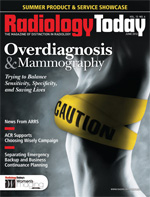 June 2012
June 2012
Overdiagnosis and Mammography
By Jim Knaub
Radiology Today
Vol. 13 No. 6 P. 3
If you cannot determine which breast tumors will never harm a woman and which ones will prove life threatening, how do you decide which tumors to treat?
Until they can reliably differentiate between harmless and dangerous tumors, clinicians—and certainly patients—will answer that they have to treat them all. Data suggesting that mammography screening leads to overdiagnosis and unnecessary treatment won’t change that in this country.
“None of us could look at a cancer and say we didn’t have to treat it,” says Robin B. Shermis, MD, medical director of Toledo Hospital Breast Care Center in Ohio. “However, we’ve seen tiny cancers metastasize and large cancers do nothing. We’re not in a position to guess whether or not a tumor could lead to cancer.”
So how do you balance that clinician’s view with a Harvard Medical School study that found routine mammography screening overdiagnoses 15% to 25% of breast cancer cases because mammography can’t differentiate between progressive and nonprogressive tumors?
The perfect answer would be better diagnostic tools to eliminate overdiagnosis (or overtreatment, depending on how you look at it). But since we don’t live in that perfect world, doctors must make do with what they have. Mammography is still the gold standard of breast cancer screening and saves lives, and clinicians don’t like seeing that standard devalued. They’re aware of mammography’s limitations, but it’s still the screening tool of choice until a better one comes along. That said, epidemiology looks at mammography from a broader perspective, and the Harvard study found what it found.
“It’s disappointing to people to hear that screening mammography isn’t the tool that it’s been presented as,” says Rulla M. Tamimi, ScD, a Harvard epidemiologist and coauthor of the recent overdiagnosis study in the Annals of Internal Medicine. “Dialogue about overdiagnosis is important to get out there so that research and developments don’t stay stagnant.”
Getting the discussion going is good. Developing better tools to diagnose cancers is good, too. But clinicians worry that women, and even some physicians, will interpret the epidemiologic study as a reason for women to forgo a mammogram. Kathy Hardy’s article on overdiagnosis appears on page 24.
Enjoy the issue.
jknaub@gvpub.com

